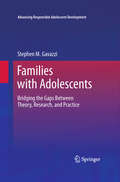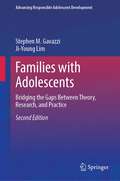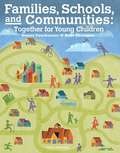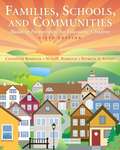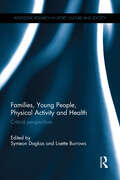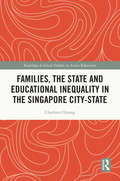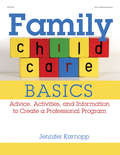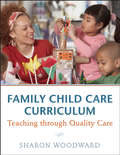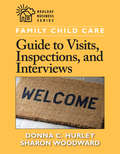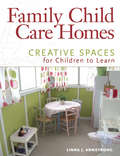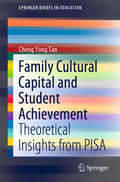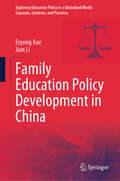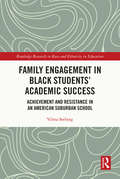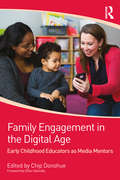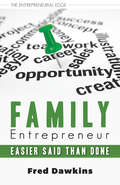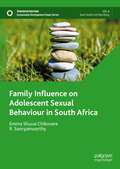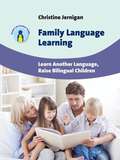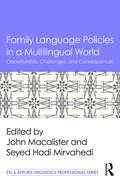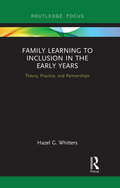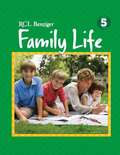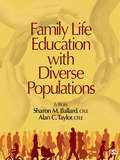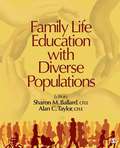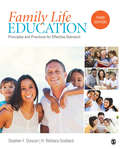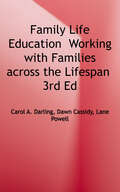- Table View
- List View
Families with Adolescents
by Stephen GavazziThis book focuses a unique panoramic lens on the study of adolescent development. It offers a clear blueprint for more consistently improved practice, emphasizing family process and structure instead of individual developmental stages.
Families with Adolescents: Bridging the Gaps Between Theory, Research, and Practice (Advancing Responsible Adolescent Development)
by Stephen M. Gavazzi Ji-Young LimThe second edition of this book offers an expanded and updated blueprint for more consistently improved practice, emphasizing family process and structure instead of only individual developmental stages. Its chapters deftly summarize the recent knowledge base about families with adolescents and explains how to apply these results across mental health and social services disciplines. The new edition clearly illustrates family concerns and theoretical perspectives through real-world vignettes and cogent use of family assessment measures. Chapters offer a broad understanding of how diversity in all its forms – including race/ethnicity, culture, religion, and sexual orientation – has created a much more nuanced understanding of how families with adolescents are able to function within their environment. Both major challenges to families and communities form the backdrop of the second edition’s focus on forecasting in which the theoretical, empirical, and intervention literatures necessarily move in service to the health and well-being of families with adolescents.Featured topics include: Central concepts of family development, family systems, ecological, attachment, and social learning theories in relation to families with adolescents. Influence of the family on adolescent problem behavior, mental health concerns, substance use issues, educational attainment, and social competence outcomes. Selected studies on parenting behaviors, conflict resolution, and other major aspects of families with adolescents. Application topics in family-based intervention and prevention programs. Integrating theory, research, and applications to create a “triple threat” model. Diversity issues surrounding race/ethnicity, culture, religion, and sexual orientation. Families with Adolescents, Second Edition, is an essential resource for researchers, professors, and graduate and advanced undergraduate students as well as professionals and other mental health clinicians, practitioners, and therapists in clinical child and developmental psychology, family studies, human development, sociology, social work, education, and all allied disciplines.
Families, Schools And Communities: Together For Young Children
by Donna Couchenour Kent ChrismanFAMILIES, SCHOOLS, AND COMMUNITIES: TOGETHER FOR YOUNG CHILDREN, 5th Edition, emphasizes the role of families and communities in children's education, and is geared to meeting national standards in teacher preparation programs. Content reflects current research and best practices in education. Divided into two sections, this book helps you understand contemporary families and provides you with the skills that you will need to build relationships with families and the community. You'll find specific ideas and strategies for increasing family involvement in the community and schools, encouraging learning at home, working with military families, recognizing family strengths, diversity in the classroom, and many other topics. New content includes integration of current standards and a new video feature as well as expanded material on advocacy, technology, and strategies for dealing with parents. Available with InfoTrac Student Collections http://gocengage.com/infotrac.
Families, Schools, and Communities: Building Partnerships for Educating Children (5th Edition)
by Chandler H. Barbour Nita H. Barbour Patricia A. ScullyThis fifth edition of Families, Schools, and Communities: Building Partnerships for Educating Children provides teachers and teacher candidates with a comprehensive guide to establishing collaboration with parents and the larger community. This text will help future teachers develop the understanding and tools they need to work with others to give children a better education. The underlying message of this book is that all persons involved in early childhood education or child advocacy should join hands in promoting the highest quality of education for young children in America. Features include: Chapter Objectives, Summaries and Questions Vignettes - real life stories/events that clarify the concepts throughout the chapters. Reflections - these reflections ask the reader to pause and connect some particular content to their own life experiences. Implications for Teachers - new feature that provides connections between the ideas in the text and real life application in classrooms and schools. Bibliography of Children's Literature New to This Edition: The authors have added features and rearranged the topics to give this text better coherence and greater usability. Readers will find we have updated references and resources throughout but have streamlined the research citations to provide for smoother reading. We removed the chapter on school curriculum but included suitable parts of that in other chapters. We have renamed some chapters to reflect changes in content, and we have grouped References by each chapter. New Figures and Tables throughout the chapters update data on demographics of American families and communities. New vignettes and illustrations to help readers understand the uniqueness of family life and the diversity in our country. "Implications for Teachers:. . . " featured in each chapter give readers practical suggestions for trying out the ideas in the real world. The Special Needs area is addressed more intensely by showing readers how to work with families of children with disabilities. Family Systems Theory is highlighted to show the importance of understanding total family functioning in addition to the differences of individuals. Protecting children has a higher profile. Authors include more information on the growing problems and concerns about obesity, bullying, substance and sexual abuse and help readers fit these concerns into the role of education. Media pluses and minuses are highlighted in our chapters so readers understand when the benefits of expanded media opportunities can shift to exploitation and abuse.
Families, Young People, Physical Activity and Health: Critical Perspectives (Routledge Research in Sport, Culture and Society)
by Lisette Burrows Symeon DagkasThe family is an important site for the transmission of knowledge and cultural values. Amidst claims that young people are failing to follow health advice, dropping out of sport and at risk of an ever-expanding list of lifestyle diseases, families have become the target of government interventions. This book is the first to offer critical sociological perspectives on how families do and do not function as a pedagogical site for health education, sport and physical activity practices. This book focuses on the importance of families as sites of pedagogical work across a range of cultural and geographical contexts. It explores the relationships between families, education, health, physical activity and sport, and also offers reflections on the methodological and ethical issues arising from this research. Its chapters discuss key questions such as: how active living messages are taken up in families; how parents perceive the role of education, physical activity and sport; how culture, gender, religion and social class shape engagement in sport; how family pedagogies may influence health education, sport and physical activity now and in the future. This book is essential reading for anyone with an interest in health, physical education, health education, family studies, sport pedagogy or the sociology of sport and exercise.
Families, the State and Educational Inequality in the Singapore City-State (Routledge Critical Studies in Asian Education)
by Charleen ChiongFocusing on Singapore’s education system from an equity perspective, Chiong’s book describes the often unheard perspectives of socio-economically disadvantaged families in Singapore. The performance of Singaporean students on international education benchmarking tests has been widely recognised. Relatively less known is how socio-economically disadvantaged families negotiate Singapore’s highly competitive, stratifying and meritocratic system. Yet, families’ perspectives can provide crucial insight in understanding how policy is ‘lived’ and experienced, and its effects on people’s lives. Drawing on 72 interviews with 12 families, this book traces the development of surprisingly close, collaborative relations between the state, schools and families on Singapore’s socio-economic margins. It demonstrates that in the 'strong' state of Singapore, families’ dependency on schools and the state facilitates the internalisation of individual and familial responsibility for future success. However, these very processes can injure, and perpetuate inequality. The analysis presented in this book has relevance in other contexts, in times where advanced capitalist states face growing inequalities and challenging relationships between institutional authority and the wider populace. As socio-economic and educational inequalities widen, this book asks timely questions and provides recommendations on what a more equitable state-citizen compact might look like. The book will appeal to researchers and students who are interested in the fields of the sociology and politics of education, social policy, and Asian culture and society.
Family Child Care Basics: Advice, Activities, and Information to Create a Professional Program
by Jennifer KarnoppBeginning a new business venture can be a daunting task, and setting up an in-home child care program can be especially challenging. After the licenses have been applied for and acquired, what comes next? Now, an expert on the subject provides advice, tips, information, and activities for setting up a child care program and running it smoothly. From creating a healthy, safe environment for children to developing engaging activities that can be used to shape daily plans, Family Child Care Basics shows how to plan and implement a program where children will learn, play, and thrive. Topics include:* Setting up Your Environment* Toys and Materials* Setting a Schedule* Developing a Curriculum* Daily Planning * Child Growth and Development
Family Child Care Curriculum
by Sharon Woodward200 fun and educational activities!A successful family child care (daycare) program promotes the healthy development of infants, toddlers, and preschool children in a caring, nurturing environment. Enrich your program and support children's early learning with best practices and activities designed specifically for family child care professionals.Family Child Care Curriculum includes a wealth of creative and inclusive activities that meet age-appropriate developmental objectives. Activities are organized both by age and developmental domain-physical and motor, cognitive, communication and language, and social and emotional-and complement the overall goals of a quality family child care program. These activities can be used with multiage groups of children and are easily implemented in your daily routine. This complete curriculum also includesFour developmental milestone charts describing typical development from birth through age fiveTips to provide quality learning environments and twenty-nine evaluation questions to improve your programSuggestions to create successful partnerships with familiesAdditional resources to help you develop a well-rounded program, including safety information and daily schedules
Family Child Care Guide to Visits, Inspections, and Interviews
by Donna C. Hurley Sharon WoodwardLearn the skills and best practices to make receiving visits more productive and worry-freeAs a family child care professional, you nurture and teach children during their most formative years. Being a family child care provider also means you must attend to families, licensors, food program representatives, coaches, and other people who visit your in-home business. This guide is filled with everything you need to successfully prepare for and host visits from people involved in the operation and regulation of your business.This book includes case studies featuring more than twenty common challenges that can occur during visits and skill-based solutions and successful strategies you can use to prepare for those situations. It also provides checklists and self-examination activities to help you welcome and connect with potential families, specialists, and inspectors in positive ways, as well as support, guidance, and techniques to enhance your program.Donna C. Hurley has been writing and delivering trainings for providers, parents, and home visitors or more than forty years.Sharon Woodward has more than twenty years of experience supporting family child care professionals.
Family Child Care Homes
by Linda J. ArmstrongCreate a warm and inviting place where children feel at home.Discover the many ways your home can provide comfortable places where children love to learn and love to be. Filled with no- and low-cost ideas, this book demonstrates many unique and practical possibilities for your home's indoor and outdoor spaces. Chapters are packed with colorful photographs and provide examples and tips for designing learning zones, selecting items, organizing materials, and more. Checklists, resources, and questions are included to help you evaluate your setting, implement changes, and create a place that feels like a second home to the children in your care.
Family Cultural Capital and Student Achievement: Theoretical Insights from PISA (SpringerBriefs in Education)
by Cheng Yong TanThis book focuses on the relationship between cultural capital and student achievement. It fills the gap in the literature on large-scale quantitative studies of the effects of cultural capital. In particular, the review of empirical evidence presented, especially that from studies analyzing large-scale, international data from the Programme for International Student Assessment (PISA), makes a substantial contribution to the literature. This review addresses the knowledge gap on reviews investigating the effects of different forms of cultural capital on student achievement as compared to the more established evidence base in the related field of socioeconomic status.
Family Education Policy Development in China (Exploring Education Policy in a Globalized World: Concepts, Contexts, and Practices)
by Jian Li Eryong XueThis book provides a comprehensive overview of family education policy development in China. Each chapter draws upon existing literature, reviews the policy text and implementation data, identifies the challenges of and problems in the policy implementation process, and proposes corresponding countermeasures and solutions. It examines a wide range of education policies in China, including the management policy of family education organization, family education resource allocation policy, family education guidance service policy, the educational policy on the parent-school cooperation, school support-based family education policy, community support-based family education policy, family education monitoring and evaluation policy, and family education responsibility sharing policy.
Family Engagement in Black Students’ Academic Success: Achievement and Resistance in an American Suburban School (Routledge Research in Race and Ethnicity in Education)
by Vilma SeebergThis timely volume presents powerful stories told by Black families and students who have successfully negotiated a racially fraught, affluent, and diverse suburban school district in America, to illustrate how they have strategically contested sanctioned racist practices and forged a path for students to achieve a high-quality education. Drawing on rich qualitative data collected through interviews and interactions with parents and kin, students, community activists, and educators, Family Engagement in Black Students’ Academic Success chronicles how pride in Black American family history and values, students’ personal capabilities, and their often collective, proactive challenges to systemic and personal racism shape students’ academic engagement. Familial and collective cultural wealth of the Black community emerges as a central driver in students’ successful achievement. Finally, the text puts forward key recommendations to demonstrate how incorporating the knowledge and voices of Black families in school decision making, remaining critically conscious of race and racial history in everyday actions and longer term policy, and pursuing collective strategies for social justice in education, will help eliminate current opportunity gaps, and will counteract the master narrative of underachievement ever-present in America. This volume will be of interest to students, scholars, and academics with an interest in matters of social justice, equity, and equality of opportunity in education for Black Americans. In addition, the text offers key insights for school authorities in building effective working relationships with Black American families to support the high achievement of Black students in K-12 education.
Family Engagement in the Digital Age: Early Childhood Educators as Media Mentors
by Chip DonohueFamily Engagement in the Digital Age: Early Childhood Educators as Media Mentors explores how technology can empower and engage parents, caregivers and families, and the emerging role of media mentors who guide young children and their families in the 21st century. This thought-provoking guide to innovative approaches to family engagement includes Spotlight on Engagement case studies, success stories, best practices, helpful hints for media mentors, and "learn more" resources woven into each chapter to connect the dots between child development, early learning, developmentally appropriate practice, family engagement, media mentorship and digital age technology. In addition, the book is driven by a set of best practices for teaching with technology in early childhood education that are based on the National Association for the Education of Young Children (NAEYC) and Fred Rogers Center joint position statement on Technology and Interactive Media. Please visit the Companion Website at http://teccenter.erikson.edu/family-engagement-in-the-digital-age
Family Entrepreneur: Easier Said Than Done
by Fred DawkinsA course in family-business entrepreneurship, taught through a narrative about four frustrated people taking a seminar that changes their lives. Limited time offer. In the second book in the Entrepreneurial Edge series, frustrated individuals, immersed in family businesses, enroll in a two-week course on entrepreneurship that will change their lives. For ten years Mary has been an office manager at her brother’s business only to see her younger brother join the company and receive shares while she gets none. Plagued by doubts about her ability to change the culture in the family business or succeed outside it, Mary signs up for a seminar series on family entrepreneurship. A crusty mentor named Sam conducts the seminars in a class that includes three others: a son considering taking over a family business, the owner of a successful company involving her two daughters, and a man with a stormy working relationship with his sister. The narrative brings us right into the class as Sam cleverly leads all of us to decisions about our future. Anyone interested in entrepreneurship, starting a business, or just managing their career will benefit from the shared experiences of this compelling story. Watch for Ageless Entrepreneur, arriving May 2015.
Family Influence on Adolescent Sexual Behaviour in South Africa (Sustainable Development Goals Series)
by R. Sooryamoorthy Emma Shuvai ChikovoreThis book explores the connection between family structure and circumstances, parental engagement, and adolescent sexual behavior. Given that South Africa contains the highest portion of the global HIV epidemic within a single country, a comprehensive, book-length investigation into—sometimes risky—adolescent sexual behaviour is necessary. Drawing from the longitudinal Cape Area Panel Study (CAPS) of more than 4,000 adolescents between the ages of fourteen and twenty-two, as well as qualitative interviews and focus group discussions with parents and adolescents, this study pioneers empirical investigation of adolescent sexual behavior within the intricate framework of family dynamics in South Africa.
Family Language Learning
by Christine JerniganFamily Language Learning is a practical guide designed to support, advise and encourage any parents who are hoping to raise their children bilingually. It is unique in that it focuses on parents who are not native speakers of a foreign language. It gives parents the tools they need to cultivate and nurture their own language skills while giving their children an opportunity to learn another language. The book combines cutting-edge research on language exposure with honest and often humorous stories from personal interviews with families speaking a foreign language at home. By dispelling long-held myths about how language is learned, it provides hope to parents who want to give their children bilingual childhoods, but feel they don't know where to start with learning foreign languages.
Family Language Policies in a Multilingual World: Opportunities, Challenges, and Consequences (ESL & Applied Linguistics Professional Series)
by John Macalister Seyed Hadi MirvahediThrough case studies from around the world, this book illustrates the opportunities and challenges facing families negotiating the issues of language maintenance and language learning in the home. Every family living in a bi/multilingual environment faces the question of what language(s) to speak with their children and must make a decision, consciously or otherwise, about these issues. Exploring links between language policy in the home and wider society in a range of diverse settings, the contributors utilize various research tools, including interviews, questionnaires, observations, and archival document analysis, to explore linguistic ideologies and practices of family members in the home, illuminating how these are shaped by macro-level societal processes.
Family Learning to Inclusion in the Early Years: Theory, Practice, and Partnerships
by Hazel G. WhittersUsing theory and practice to explore partnerships between professionals and families, Family Learning to Inclusion in the Early Years adds to current expertise through deeper insight into the complexities of inclusion within a specific context of family learning. The book presents inclusive practice which reflects the individuality of each child. Application of a therapeutic approach to promote, or to minimise, behaviour through self-regulation is demonstrated to the reader by illustrative examples. Hazel G. Whitters emphasises the value of supporting every child at the very beginning of a lifelong learning journey by activating the vocational skills of the early years’ workforce. Beginning with a discussion of the concept of family in the 21st century, descriptive scenarios help readers to link theory to the reality of daily practice in a clear and useful way. The book presents a generational cycle of development through a theoretical and practical perspective, and explains how practice can contribute to closing the implementation gap within a context of family learning and inclusion in the early years. It encourages exchange of knowledge and understanding on issues, prompting readers’ reflection, re-configuration, discussion, dissent, argument, or agreement. An essential read for any in the field of inclusive lifelong learning, this book will be of interest to academics, post-graduate students, and researchers in the field of early years’ education, as well as those working within services.
Family Life 5
by David ThomasStudent Book highlights the virtues and skills needed for family life. Links parents and teachers with a two-page Family Time Feature. Lessons are presented in three parts: Engage, Teach, Apply. Student book includes unit reviews, glossary and a section of Catholic prayers and practices.
Family Life Education With Diverse Populations
by Sharon M. Ballard Dr Alan C. TaylorFamily and human service professionals in a variety of disciplines engage in family life education, which is designed to strengthen, enrich, and empower families. This includes many content areas such as couple and parent-child relationships, balancing work and family, parenting, financial literacy, interpersonal communication, and sexuality. The authors bridge the gap between research and practice by examining and presenting key strategies for working with diverse populations including those based on race and ethnicity, family structure, geographic location, and context. By defining eleven diverse groups and presenting their strengths and unique cultural characteristics, the authors present an evidence-based practice approach with each chapter, prescribing the best practices for working with these diverse groups in regard to general FLE needs, educator characteristics, ethical considerations, marketing and recruitment, modes of learning, and environmental considerations. This book is essential for students who are preparing to work with families, as well as professionals engaging in FLE activities with diverse populations.
Family Life Education with Diverse Populations
by Sharon M. Ballard Alan C. TaylorFamily Life Education with Diverse Populations is a T2 for courses in Family Life Education. Family Studies and Social Work students often go through the additional certification of becoming Family Life Educators (FLEs). As a family life educator, the student will help educate families in and outside the traditional classroom environment on how to strengthen relationships in the home and foster positive individual, couple and family development. Such education comprises many topics, including marriage education, parenting skills, anger management, to strategies in adjusting to divorce. This book takes the content delivered in courses on FLE a step further by examining and presenting key strategies for working with diverse populations. Diverse is defined broadly in terms of race and ethnicity, but also by setting, such as military families, rural families, families with loved ones in prison, and more. The book is unique in defining the group and presenting their strengths, and then prescribing treatments and strategies for working with each group. In addition, the book takes an evidence based practice approach and demonstrates proven strategies in working with the populations listed above. Sharon M. Ballard, Ph. D. , CFLE, CFCS: is an Associate Professor in the Department of Child Development and Family Relations at East Carolina University. Alan C. Taylor, Ph. D. CFLE: is an Assistant Professor in the Department of Child Development and Family Relations at East Carolina University.
Family Life Education: Principles and Practices for Effective Outreach
by Stephen (Steve) Duncan H. (Harold) GoddardA practical how-to guide to developing, implementing, evaluating, and sustaining effective family life education programs. Drawing on the best scholarship and their own years of professional experience, the authors of this thoroughly updated Third Edition begin by discussing the foundations of family life education and encourage readers to develop their own outreach philosophies. The book then helps readers learn principles and methods for reaching out to the public and how to form and use community collaborations and use principles of social marketing to promote programs.
Family Life Education: Principles and Practices for Effective Outreach
by Stephen (Steve) Duncan H. (Harold) GoddardA practical how-to guide to developing, implementing, evaluating, and sustaining effective family life education programs. Drawing on the best scholarship and their own years of professional experience, the authors of this thoroughly updated Third Edition begin by discussing the foundations of family life education and encourage readers to develop their own outreach philosophies. The book then helps readers learn principles and methods for reaching out to the public and how to form and use community collaborations and use principles of social marketing to promote programs.
Family Life Education: Working with Families Across the Lifespan
by Carol A. Darling Dawn CassidyThis text is the first ever developed as an undergraduate level textbook for Family Life Education. It introduces the theory, principles, and skills necessary to prepare, present, and evaluate family life education programs and workshops. The text is based on the National Council of Family Relations guidelines for undergraduate education, and integrates theory and applications appropriate for established areas of education such as high schools, educational extension services, and community and youth centers. The scope includes sex education, marriage and family relations, parenting, and youth services.
